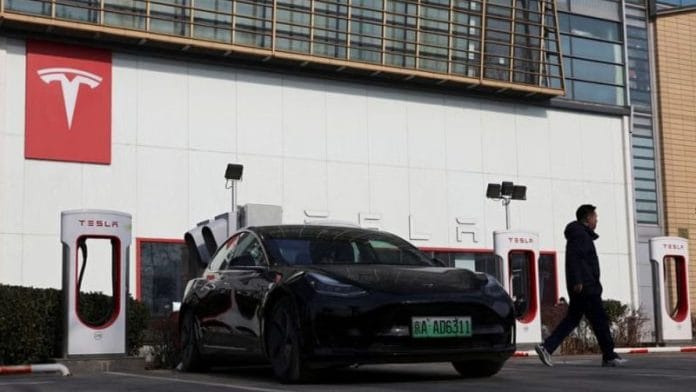Tesla has long sought to enter the Indian market. The latest Union budget, which reduced import duty on overseas vehicles, has paved the way for the US-based electric vehicle company in India.
The Indian government has long imposed heavy import duty on vehicles to protect the domestic automobile sector. For vehicles valued more than $ 40,000, 110 per cent import duty was imposed. Now, the import duty has been reduced to 70 per cent. Along with this, Tesla has also started the process of opening showrooms in India.
Indian automobile companies have been opposing reductions in import duty on cars including Tesla. Their opposition was not without reason. About three years ago, when Tesla CEO Elon Musk, who is now a part of US President Donald Trump’s administration, started lobbying for duty reduction, the EV sector was at a nascent stage in India.Indian carmakers argued that if the import duty is reduced, it would jeopardise domestic manufacturing.
Impact on Indian EV market
A year ago, Centre had put a condition that Tesla would start its production in India. As far as the import of cars is concerned, the company was allowed to import 8,000 Tesla cars, at a lower import duty of 15 per cent.
While the import duty has been reduced from 110 percent to 70 percent, there is a proposal to increase the maximum import limit to 50,000. This has sparked a debate on its potential impact on domestic EV manufacturing.
India’s EV industry is growing rapidly at an annual rate of over 20 per cent, with the market size projected to reach nearly $118 billion by 2032. Currently, EVs account for only about 5 per cent of total vehicle sales, but this figure is expected to rise 40 per cent by 2030, driven by the fast adoption of two-wheeler three-wheelers.
The government has implemented firm and favourable policies to support the adoption and manufacturing of electric vehicles. Additionally, increasing demand for electric two-wheelers and three-wheelers has been a driving force for the EV industry. At the same time, battery costs have also been declining. In the four-wheelers segment, Tata Motors and Mahindra & Mahindra are major players, while in the two-wheelers segment, Ola has emerged as a key contender.
It is notable that even after the tariff reduction on Tesla cars, the on-road price will range between Rs 45 lakh and Rs 2 crore. On the other hand, most of the Indian electric cars are priced between Rs 8 lakh and Rs 20 lakh. Therefore, the notion that the entry of Tesla cars will severely impact the sale of Indian electric cars is unfounded.
Also read: New Delhi should reject World Bank Development Report. Don’t let go of Atmanirbhar Bharat
Push from Union government
The government of India has been actively promoting the EV industry through various initiatives. Fiscal incentives include the Faster Adoption and Manufacturing of (Hybrid and) Electric Vehicles (FAME) India scheme, which provides financial support for EV purchases and charging infrastructure. Additionally, the Goods and Services Tax (GST) on EVs has been reduced from 12 per cent to 5 per cent.
Apart from this, subsidies are also available for purchasing electric vehicles. The government has also introduced incentives for efficient charging infrastructure rollouts, such as digital transactions.
Production-Linked Incentive (PLI) Scheme has been launched to promote domestic manufacturing of EVs and their components. The government has set ambitious targets for the installation of public charging stations.
The states are also implementing their individual EV policies. These policies include financial incentives for purchases, exemption from road taxes and car registration fees, and low loan interest rates. In Delhi and many other states, EVs are exempted from payment of road tax.
Overall, the government of India is providing a comprehensive push to the EV industry through fiscal and non-fiscal incentives, production-linked incentives, and state-wise policies.
The China challenge
Following the government’s decision to reduce tariffs on imported cars, including Tesla, there is an impression that Tesla may take away a big chunk of the Indian EV market. But the fact of the matter is that the company can sell a maximum of 50,000 vehicles in India.
Meanwhile, Chinese giants have already started capturing the EV market. Chinese EV players in India include BYD, backed by American billionaire Warren Buffett. Other Chinese companies have also been trying to set up their manufacturing bases in India. However, the Indian government has tightened scrutiny on investments from China, which has slowed their expansion plans. Despite this, Chinese companies are finding ways to navigate these challenges by partnering with US and European companies.
Even though, the government has discouraged the entry of Chinese cars in India due to security concerns, a big challenge remains—reliance on China for EV components. Indian EV companies depend on China for components such as batteries and motors.
In the recent budget, the government made a serious attempt to encourage the domestic production of batteries and motors by reducing the basic customs duties on critical raw materials. Under the Aatmanirbhar Bharat initiative, India will progress toward self-reliance in the production of electric vehicles.
Ashwani Mahajan is a professor at PGDAV College, University of Delhi. He tweets @ashwani_mahajan. Views are personal.
(Edited by Ratan Priya)






